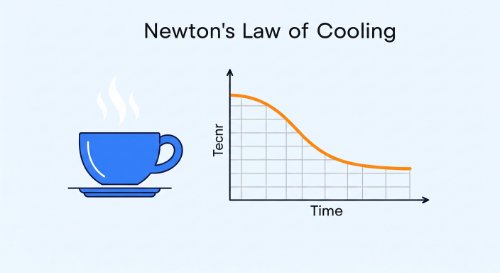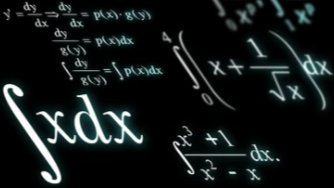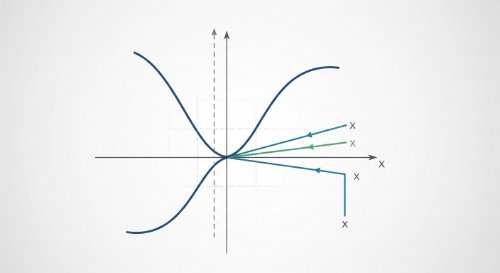MAT 241: Ordinary Differential Equations
Learning Track Courses
 Ordinary Differential Equations - Mathematical Methods (Undergraduate Advanced)This course provides a complete guide to solving ordinary differential equations (ODEs). It covers the classification of differential equations and details the solution methods for first-order equations, including separable, homogeneous, exact, and linear types. The course then moves to second-order linear equations with constant coefficients and covers the methods of undetermined coefficients and variation of parameters.
Differential equations are the mathematical language used to model dynamic systems in science and engineering. They are used to describe the motion of objects, the flow of electric circuits, population growth, radioactive decay, and chemical reaction rates. A command of this subject is a non-negotiable requirement for any serious study in physics, engineering, or applied mathematics.
By the end of this course, you will be able to classify any ordinary differential equation by its order, degree, and linearity. You will be able to solve a wide variety of first-order ODEs and constant-coefficient second-order ODEs. You will also be able to model and solve real-world problems, such as orthogonal trajectories, exponential growth and decay, and simple electric circuits.
This course is for undergraduate students in mathematics, physics, engineering, and chemistry. It is a standard module in any mathematical methods curriculum and assumes a full prerequisite knowledge of single and multivariable calculus. It is an essential foundation for the study of partial differential equations, control theory, and advanced physics.
Ordinary Differential Equations - Mathematical Methods (Undergraduate Advanced)This course provides a complete guide to solving ordinary differential equations (ODEs). It covers the classification of differential equations and details the solution methods for first-order equations, including separable, homogeneous, exact, and linear types. The course then moves to second-order linear equations with constant coefficients and covers the methods of undetermined coefficients and variation of parameters.
Differential equations are the mathematical language used to model dynamic systems in science and engineering. They are used to describe the motion of objects, the flow of electric circuits, population growth, radioactive decay, and chemical reaction rates. A command of this subject is a non-negotiable requirement for any serious study in physics, engineering, or applied mathematics.
By the end of this course, you will be able to classify any ordinary differential equation by its order, degree, and linearity. You will be able to solve a wide variety of first-order ODEs and constant-coefficient second-order ODEs. You will also be able to model and solve real-world problems, such as orthogonal trajectories, exponential growth and decay, and simple electric circuits.
This course is for undergraduate students in mathematics, physics, engineering, and chemistry. It is a standard module in any mathematical methods curriculum and assumes a full prerequisite knowledge of single and multivariable calculus. It is an essential foundation for the study of partial differential equations, control theory, and advanced physics.
This course provides a complete guide to solving ordinary differential equations (ODEs). It covers the classification of differential equations and details the solution methods for first-order equations, including separable, homogeneous, exact, and linear types. The course then moves to second-order linear equations with constant coefficients and covers the methods of undetermined coefficients and variation of parameters. Differential equations are the mathematical language used to model dynamic systems in science and engineering. They are used to describe the motion of objects, the flow of electric circuits, population growth, radioactive decay, and chemical reaction rates. A command of this subject is a non-negotiable requirement for any serious study in physics, engineering, or applied mathematics. By the end of this course, you will be able to classify any ordinary differential equation by its order, degree, and linearity. You will be able to solve a wide variety of first-order ODEs and constant-coefficient second-order ODEs. You will also be able to model and solve real-world problems, such as orthogonal trajectories, exponential growth and decay, and simple electric circuits. This course is for undergraduate students in mathematics, physics, engineering, and chemistry. It is a standard module in any mathematical methods curriculum and assumes a full prerequisite knowledge of single and multivariable calculus. It is an essential foundation for the study of partial differential equations, control theory, and advanced physics.
 Solutions of First-Order and Reducible Higher-Order Ordinary Differential Equations - Mathematical Methods (Undergraduate Advanced)This course breaks down the key types of first-order ordinary differential equations (ODEs) — separable, homogeneous, exact, linear, and more — plus how to handle tricky non-homogeneous and inexact ones by transformations.
You’ll also learn how to reduce certain higher-order equations into first-order ones you already know how to solve.
The course is straight to the point, method-focused, and designed to build your confidence with step-by-step explanations and examples.
If you're a science, engineering, or math student or professional who wants clarity without fluff, this is for you.
Solutions of First-Order and Reducible Higher-Order Ordinary Differential Equations - Mathematical Methods (Undergraduate Advanced)This course breaks down the key types of first-order ordinary differential equations (ODEs) — separable, homogeneous, exact, linear, and more — plus how to handle tricky non-homogeneous and inexact ones by transformations.
You’ll also learn how to reduce certain higher-order equations into first-order ones you already know how to solve.
The course is straight to the point, method-focused, and designed to build your confidence with step-by-step explanations and examples.
If you're a science, engineering, or math student or professional who wants clarity without fluff, this is for you.
This course breaks down the key types of first-order ordinary differential equations (ODEs) — separable, homogeneous, exact, linear, and more — plus how to handle tricky non-homogeneous and inexact ones by transformations. You’ll also learn how to reduce certain higher-order equations into first-order ones you already know how to solve. The course is straight to the point, method-focused, and designed to build your confidence with step-by-step explanations and examples. If you're a science, engineering, or math student or professional who wants clarity without fluff, this is for you.
 Introduction to Numerical Methods (Undergraduate Foundation)This course covers numerical methods for solving problems that have no exact analytical solution. It is a practical study of iterative approximation techniques. The material is focused on two core areas: finding the roots of single-variable equations using the Bisection and Newton's methods, and approximating definite integrals using the Trapezoidal and Simpson's rules.
Numerical methods are the foundation of all modern computational problem-solving in science, engineering, and finance. These are the algorithms that power computer simulations, engineering design software, and financial modelling tools. The ability to find approximate solutions to complex equations is a fundamental skill for any technical or scientific professional.
By the end of this course, you will be able to apply the Bisection and Newton's methods to find the roots of single-variable equations. You will also be able to use the Trapezoidal and Simpson's rules to calculate the approximate value of definite integrals, providing a core toolkit for numerical approximation.
This course is for undergraduate foundation students in engineering, physics, and computer science. It is an essential topic for anyone who will use computational tools to solve mathematical problems. A solid understanding of single-variable calculus is a prerequisite.
Introduction to Numerical Methods (Undergraduate Foundation)This course covers numerical methods for solving problems that have no exact analytical solution. It is a practical study of iterative approximation techniques. The material is focused on two core areas: finding the roots of single-variable equations using the Bisection and Newton's methods, and approximating definite integrals using the Trapezoidal and Simpson's rules.
Numerical methods are the foundation of all modern computational problem-solving in science, engineering, and finance. These are the algorithms that power computer simulations, engineering design software, and financial modelling tools. The ability to find approximate solutions to complex equations is a fundamental skill for any technical or scientific professional.
By the end of this course, you will be able to apply the Bisection and Newton's methods to find the roots of single-variable equations. You will also be able to use the Trapezoidal and Simpson's rules to calculate the approximate value of definite integrals, providing a core toolkit for numerical approximation.
This course is for undergraduate foundation students in engineering, physics, and computer science. It is an essential topic for anyone who will use computational tools to solve mathematical problems. A solid understanding of single-variable calculus is a prerequisite.
This course covers numerical methods for solving problems that have no exact analytical solution. It is a practical study of iterative approximation techniques. The material is focused on two core areas: finding the roots of single-variable equations using the Bisection and Newton's methods, and approximating definite integrals using the Trapezoidal and Simpson's rules. Numerical methods are the foundation of all modern computational problem-solving in science, engineering, and finance. These are the algorithms that power computer simulations, engineering design software, and financial modelling tools. The ability to find approximate solutions to complex equations is a fundamental skill for any technical or scientific professional. By the end of this course, you will be able to apply the Bisection and Newton's methods to find the roots of single-variable equations. You will also be able to use the Trapezoidal and Simpson's rules to calculate the approximate value of definite integrals, providing a core toolkit for numerical approximation. This course is for undergraduate foundation students in engineering, physics, and computer science. It is an essential topic for anyone who will use computational tools to solve mathematical problems. A solid understanding of single-variable calculus is a prerequisite.